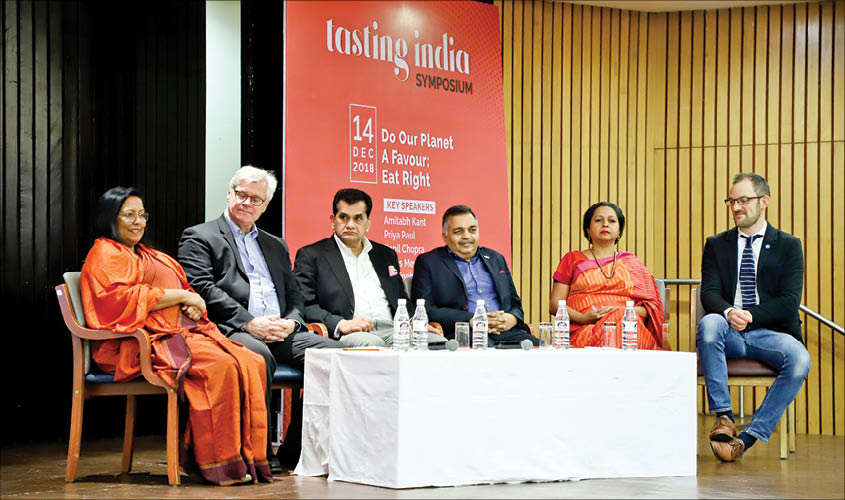India has seen a rise of issues related to farm produce lately. To counter this, efforts have been made to adopt a sustainable approach towards the production and consumption of food. But problems like lack of nutrition, wastage etc., continue to pose a serious threat.
The third edition of Tasting India Symposium, held in New Delhi from 14-16 December aimed to address these challenges by conducting seminars, workshops, dialogues and debates on our food culture. Recognised as part of the global food policy initiative, this year’s symposium was themed around the concept “Eat Right”.
The three-day event was supported by NITI Aayog, the Food Safety and Standards Authority of India (FSSAI) and The Nordics (Nordic Council of Ministers). It brought together various players of food industry—from farmers and food processors to hotels and restaurants, chefs and consumers.
Food entrepreneurs Sourish Bhattacharya and Sanjoo Malhotra started the Tasting India forum in 2015 to promote and develop the Indian food industry. This year, they based the symposium on innovative, consumer-oriented policies aiming to steer our food culture in a more sustainable direction. So all the sessions at the Tasting India Symposium 2018 were in line with the UN’s sustainable development goal of “zero hunger” by 2030.
The prelude of the symposium on 13 December saw Pawan Agarwal, CEO, FSSAI, initiating a workshop on Indo-Nordic food policy. He spoke about new food policies and encouraged healthy dietary habits. He highlighted the achievements of their Eat Right Movement, which aims to create awareness about good food comsumption. Agarwal also announced the national food regulator’s goal of coming up with 100 safe street-food hubs across the country. This was followed by a presentation of case studies on various successful food policy inventions in the Nordic countries. Mads Frederik Fischer Moller, senior advisor (Agriculture), Nordic Food Policy Lab, headed this session.
The inaugural day of the symposium began with a keynote address by Amitabh Kant, CEO, NITI Aayog. He said, “India has a very vibrant and diverse culture offering a fascinating variety of unique tastes, from the coast of Malabar to the strong flavours of Kashmir. And I am happy that Tasting India Symposium, which I have been a part of since its inception, is taking firm strides towards encouraging and evolving a collective vision of a sustainable, nutritious and inclusive food culture.”
The event was attended by eminent stakeholders and change-makers of the food industry. The guests of honour were Claus Meyer, co-founder, Noma and The Standard, author of The New Nordic Kitchen Manifesto; and Vineet Bhatia, the first Indian chef-restaurateur to receive a Michelin star. They shared their thoughts on how best to promote Indian gastronomy and culinary tourism in India. Dignitaries from various Ministries came forward to support the event.
The sessions on Day 1 included the launch of Young Chefs Association for Sustainable India; talks on “Making Hunger History: Tech Solutions to Farm Challenges”; and on “Making Our Cities Food Smart: Nordic Routes, Indian Innovations”. The points raised here touched upon zero food waste, urban agriculture, organic markets and food service innovation.

The day also witnessed the Indian Food History and Culture Conclave, where Collen Talor Sen, food historian and author of Fasting, Feasting: A History of Food in India, held a roundtable with Kaveri Ponnapa, author of The Vanishing Kodavas. The day ended with the “Celebration of Street Food” session, curated by Abhishek Basu, executive chef, The Park, New Delhi; and Asma Khan, chef-owner, Darjeeling Express, London. This was an effort by the organisers to display healthy street-food trends.
Day 2 of the Tasting India Symposium commenced with a workshop on “Eat Right in India: Road Map to Sustainable Gastronomic Tourism”. It was held in association with FSSAI’s Eat Right Mela. This particular session explored the possibilities of employing Indian gastronomy to benefit the tourism sector. India has many cuisines and the diverse offerings can prove to be a big attraction for tourists.
After this, a citizens’ white paper on the future of “Gastronomic Tourism in India”, co-authored by Sourish Bhattacharya and Sanjoo Malhotra, was presented. It made some strong points about what India has to offer in terms of culinary depth and diversity. They insisted that our heritage must be used to promote culinary tourism. A panel discussion on “Safe and Right: Repositioning Indian Street Food in the Global Mindspace” took place next. The highlight of the day was a cooking demonstration by Chef Vineet Bhatia.
Later that day, the Tasting India team launched “SWAAD: International Day For Indian Gastronomy”. In a statement to the team, Sushma Swaraj, External Affairs Minister, congratulated them for conceptualising the idea. She said, “India will extend an open invitation to the world to explore its myriad tastes and flavours. Today, the first step has been taken to forge the network that will drive SWAAD. I am confident that it would become an annual celebration of Indian gastronomy.” This was followed by a panel discussion on “Global Flavors of Indian Cuisine: Giving the World a SWAAD of India”. The second day concluded with a dinner celebrating the spirit of inclusivity in the hospitality industry.
The last day of the symposium witnessed the global launch of the book titled Nutrition: What Really Counts by Dr Harald Stossier, Bollywood’s wellness guru and founder-director of highly sought-after VIVAMayer clinic in Austria.
The Tasting India Symposium 2018 was successful in conducting a dialogue on Indian culinary heritage, gastronomic tourism potential, farm and agri-tech innovations, diversity of products etc. Everything was done in an effort to promote and cultivate a sustainable food culture.

